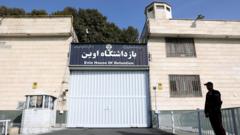The article examines the complexities of Pope Leo XIV's dual citizenship status as an American citizen and leader of Vatican City, discussing international law implications, historical precedents, and the policies in place regarding dual nationality for foreign heads of state.
Pope Leo XIV: Navigating Dual Citizenship as a Foreign Head of State

Pope Leo XIV: Navigating Dual Citizenship as a Foreign Head of State
Pope Leo XIV holds American citizenship while leading Vatican City, raising legal questions about dual nationality.
Pope Leo XIV, a lifelong American holding citizenship and the supreme leader of Vatican City, presents a unique case in international relations. As both an American citizen and the head of a foreign sovereign nation, the intricacies of dual citizenship come into play. Many ponder whether it is permissible for an American citizen to take on such a pivotal role abroad—the answer leans towards affirmation.
U.S. law accommodates dual citizenship, allowing individuals to maintain ties with their country of origin while taking on foreign nationality. The State Department recognizes that a dual citizen may serve as a foreign head of state without facing automatic loss of American citizenship. Moreover, the Holy See permits its Papal leaders to hold additional citizenships, as evidenced by Pope Francis, who retained his Argentine nationality and even renewed his Argentine passport in 2017. His predecessors also maintained their native citizenship.
In challenging cases, such as that of Pope Leo, the State Department reassures that it will "actively review" circumstances where foreign heads of state wish to keep their American citizenship. That said, such situations introduce "complex questions of international law," particularly regarding matters of immunity from American legal practices. Foreign leaders intending to retain U.S. nationality can notify the State Department, whereas renouncing citizenship involves a formal process at a U.S. embassy or consulate.
Historically, there have been instances where U.S. citizens have assumed roles as foreign heads of state. For instance, Mohamed Abdullahi Mohamed, who became president of Somalia in 2017, was a naturalized American citizen before returning to his homeland and yielding his American citizenship amid claims of divided loyalties.
Operating within the context of the Vatican, Pope Leo XIV, while also a citizen of Peru—which allows dual nationality—navigates a jurisdiction governed by the Holy See. Although it holds observer status at the United Nations, the Holy See prioritizes its political neutrality in various international issues.
As the conversation surrounding Pope Leo XIV’s citizenship continues, it remains unclear how he will manage these dual allegiances moving forward. Neither the State Department nor the Vatican has released a definitive statement regarding his intentions or plans in this intricate legal landscape. Michael Crowley, covering the intricacies of U.S. foreign policy and state affairs, will keep a vigilant eye on developments concerning the Pope’s dual citizenship situation.























